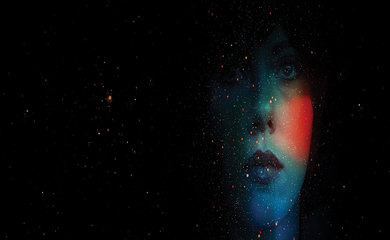Has Scarlett Johansson ever felt at ease in her own skin? That fashionable, gawky frame, part siren, part nerd, those lips propelling her clipped New York accent so considered and efficient. Like all movie stars she isn’t quite real, a flesh construct draped in chic and showered by our personal meanings, heaped at her feet like offerings to a Roman Goddess. Movie stars make the best aliens and Scarlett has that extra-terrestrial glide, bizarre sass that makes her fully equipped to prey on the ugly, unsuspecting Glaswegian public.
“Under the Skin” does just that. That scratchy score reminiscent of that head lice movie you waited for all day at school to get you out of lesson. Pitch-black screen and just a pinprick of light, is this what interstellar travel is really like, the birth of an eye? We are Roy Batty gazing in wonder for only four years; we are waiting to have our orb slit with a straight razor in “Un Chein Andalou.” As this particular window to the soul materialises we hear elocution lessons echo through the warp, “Pygmalion.” Has Professor Henry Hill made a bet to see if he can pass an alien killer off as an English curb-crawler?
Scarlett emerges as Laura in a brilliant white limbo, an art installation composed of death. Her Venus flytrap is a transit van, oversized and unwieldy, clumsy in her delicate hands. This working class vehicle prowls working class streets, an ever-increasing montage of men, unsuspecting males held by a sinister gaze, under the steady throb of disconnected beats. Some look back at this thrift shop Jagger, punching above their weight, some lean in through the window, others climb in hopelessly outclassed. Soon they wished they hadn’t.
Did they hope to fuck one of the old enemy? Smitten by her cut glass accent, those endless questions, that obvious flattery? Secretly do they hate her? Is she fair game? Easy game? Surely they’ve seen that house before? In the pits of hell in their nightmares, but that doesn’t stop their erection acting as a divining rod. Naked they sink into a black mire of their own making as Laura glides across the obsidian liquid like it was solid oil. Why does she want men to hang there suspended like human sharks in a Damien Hirst nightmare, flushed like the river of blood from “The Shining?” Where are the women? Didn’t Mars need them once? What desire lurks under the skin of men that is so absent from women?
Later Laura recognises the opposite sex, recognises women, tall, short, fat, thin, not smoking, smoking, smoking over their babies. What are those faint, intangible sounds that pulse under the skin of the film? Telepathic communications of alien gods or a shred of humanity gestating where none existed before? Does Laura’s conscience experience its own personal Big Bang, taking the form of a distinctive twist in the oldest light, only detectable with the most uncomfortable scrutiny? Will her biker custodians allow her such a luxury? Who can guess what their cold intelligence has in store for an errant servant or the human race?
So “Under the Skin” makes us scratch those psychedelic touchstones, “Performance,” “The Man Who Fell To Earth” and “2001” but it occupies the same unsettling space as “Prey” and “Kill List.” Johansson’s inquisitive, immersive performance becomes increasingly catatonic as Laura is forced from certainty to something akin to free will, who is ever certain of their choices when they try to leave their old life behind? Only in the last haunting shot, framed by winter, does Laura find a tenuous connection with the earth, one that evades her throughout Jonathon Glazer’s astonishing, impressionistic adaptation of Michel Faber’s novel, more “Red Road” than “Red Planet.”

